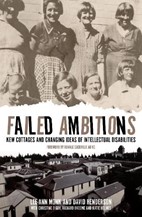Failed Ambitions: Kew Cottages and Changing Ideas of Intellectual Disabilities.
Lee-Ann Monk, David Henderson, Christine Bigby, Richard Broome and Katie Holmes. Monash University Publishing, 2023, 357 pages
A Review by Kevin Bain
A La Trobe University team has recorded the 121-year history of Kew Cottages up to its closure in 2007, with a Foreword by Disability Royal Commissioner Ronald Sackville. He notes the book’s importance in understanding the past, as the NDIS promises a better future for people with disability — high aspirations to meet self-defined needs, and a welcoming community. Yet the book’s Epilogue suggests that people with intellectual disabilities may find their needs met ‘poorly’. Why?
Looking back, the authors found little expression of ‘voice’ by clients/patients about their needs and wishes for a better life; medicos, politicians, media and Kew ratepayers were louder. Change emerged from 1970s human rights-based thinking from thought leaders such as Wolf Wolfensberger (see link below) and the UN. Self-advocacy and parent participation also increased from the 1980s. The medical model of disability lost favour to the social model, officially in Victoria with the Intellectually Disabled Persons Services Act 1986, later enhanced by the NDIS person-centred themes.
The NDIS brought generic legislation to replace the IDPS Act, and new objections: that a reduced ‘voice’ from those with intellectual disabilities would result from their absorption into the larger group of people with other disabilities. As funding support based on the client’s functional capacity implied less interest in diagnosis, there would be preventative and forward planning limitations. There remain debates about this, and the authors hope for a ‘critical realist approach…whereby society treats people with intellectual disabilities as members of the broader disability group… but protects (differentiation)…whenever necessary’.
Importantly, there were unfulfilled promises by government after the Kew Cottages closure. One was the abandonment of a community centre at the redeveloped site (which also means no shops of any sort), and second was reneging on the promised relocation of the hundred former residents, currently located on a corner of the site, to be dispersed throughout the re-developed area. Perpetuating this enclave undermined the original plan for developing friendships and social integration (the major rationale for the project). It may be that the commercial operator’s reluctance to meet obligations was the cause, but government accommodated it. Without community connection, the likely outcome for many of these local ex-Kew Cottages residents when their parents die is relocation to new institutions — aged residential care, where an enabling culture is less likely than in the disability sector.
There are familiar names and places here: normalisation advocate Ethel Temby and social worker Irina Higgins, Kew Cottages Parents Association advocates Geoff Welchman and Rosalie Trower, institutional leaders such as Dr Eric Dax and Dr Wilfred Brady, and the 9 men who died, locked in rooms without sprinklers during the 1996 fire.
Kevin Bain was funded by the Gunnar and Rosemary Dybwad Foundation to visit the US in 1998 to research residential models for severely disabled children, resulting in a Medical Journal of Australia article at https://www.mja.com.au/journal/1998/169/11/children-severe-disabilities-options-residential-care

